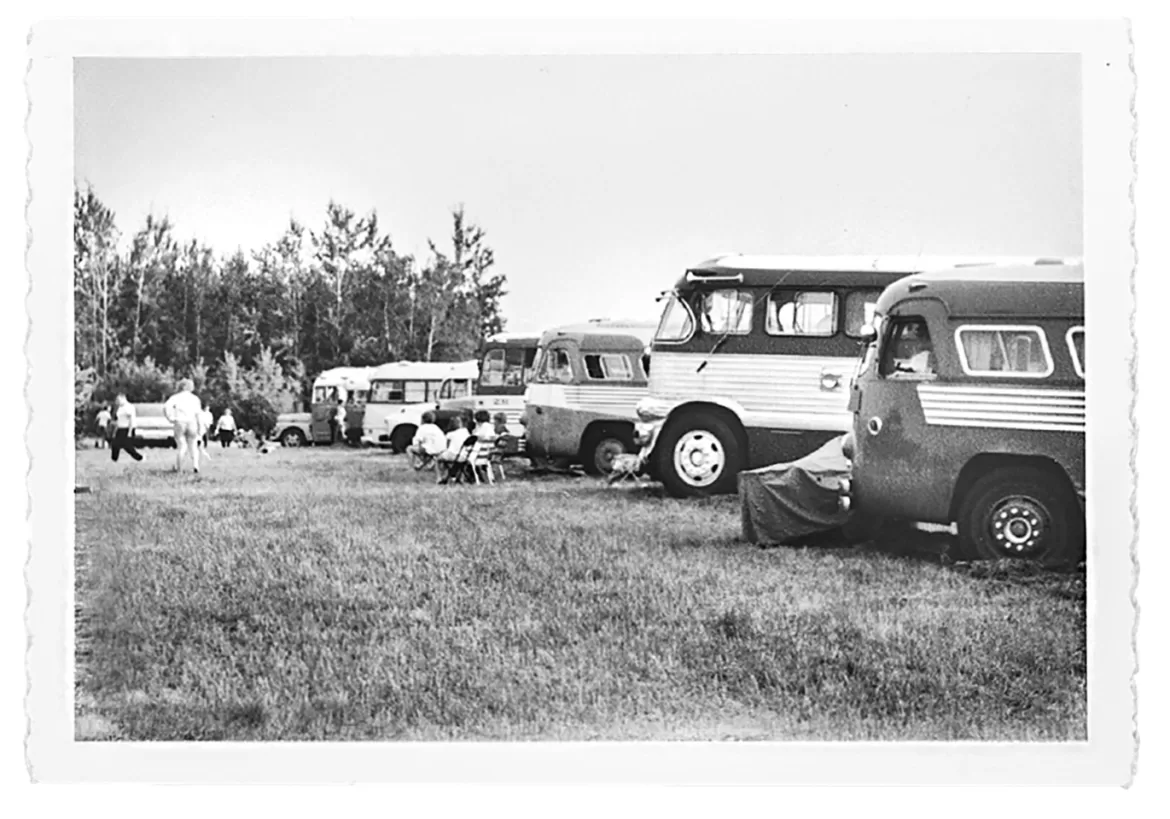FMCA has its roots in a gathering that took place 60 years ago in Maine, when a group of RV owners came together to view a total eclipse of the sun and to talk about forming an organization for like-minded travelers.
By Pamela Kay, Director Of Communications, Publishing
July 2023
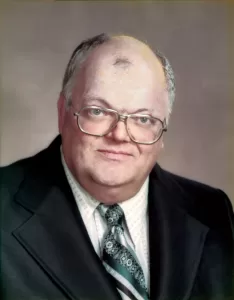
Bob Richter, FMCA founder and first president.
The year was 1963. Families had begun to discover a convenient new way to vacation. Pioneering folks purchased buses that had been decommissioned from their original roles of transporting schoolchildren or other passengers and then outfitted them as rolling homes. Many called them “house cars.” Production motor coaches were just coming into being then. Not everyone was a fan of the newfangled traveling machines, though, and these inventive families sometimes faced resistance in the communities they visited.
A few of the folks pursuing this new form of travel decided it would be beneficial to band together to work to ensure their rights; to allow for collective buying power; to exchange information and ideas; and, equally important, to enjoy each other’s company.
Among them were Bob and Jean Richter of Hanson, Massachusetts, who had converted a 1940 Greyhound bus with 2.6 million miles on it to accommodate travel with their four children. They met a couple of other families who had similar conversions, and the Richters ultimately started a list of people with rolling homes like theirs. In April 1963, they mailed out a mimeographed letter inviting families to gather in Maine to view the solar eclipse that would take place in July.
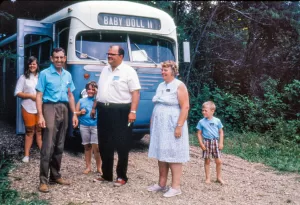
Bob Richter with Tom Duck, fourth national president.
The path of visibility of that total eclipse was so narrow that it would cross less than 1 percent of the entire surface of the Earth, and within the United States, it would be seen only over a thin strip of Alaska and 53 miles across the middle of Maine.
The eclipse created a bit of a frenzy in Maine, and it served as an exciting reason for house car owners to gather. During that get-together at the Good Will-Hinckley School in Hinckley, Maine, they decided to form FMCA, 60 years ago this month.
Bob Richter described that first gathering: “At Hinckley we set up folding tables and chairs; strung recycled gas station pennants from tree to tree for a festive note; set up the abominable mimeograph for daily newsletters; set out a bulletin board; and erected two leaky and primitive toilet tents in a far corner. It was an experience impossible to describe as we first heard — and then saw — the 26 coaches arriving, one after another, with our new friends. The coaches varied from a simple school bus on its fifth engine with only a mattress, a crib, and a stove in it, to a lush executive coach costing well into the six figures. What a sight to see them coming up the hill! And what great people!”
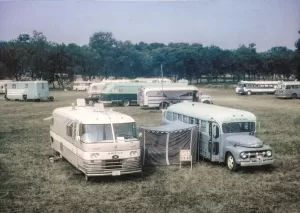
FMCA’s first convention in Fort Ticonderoga, New York, in July 1964.
By the time of FMCA’s first national convention a year later at Fort Ticonderoga, New York, FMCA had grown to include nearly 500 families from 45 states and a few other countries. At that gathering in Fort Ti, 106 families from 20 states and Canada were in attendance.
Bob Richter, with his usual eloquence, described that first convention as follows: “We’ll never, if we lived to be a hundred, forget the sight of a hundred coaches parked together in one place, with their owners getting to know neighbors-of-the-road from coast to coast, and all the children acting as if their newfound friends had been their friends for years. When a six-year-old can proclaim that her best friends are from Owosso, Michigan; Cincinnati, Ohio; and Tucson, Arizona, as our daughter Libby did, it’s memorable.”
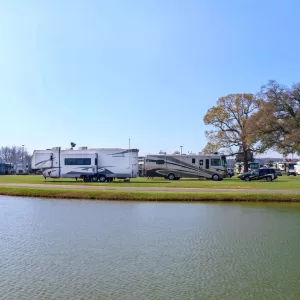
The FMCA family opened to all RV types in 2017.
The Richters and the other founding and early members of FMCA set a firm foundation for the organization that carried it into the future and helped to make it the organization it is today. Next month, FMCA will embark on convention number 107 in Gillette, Wyoming, and it’s likely that nearly all U.S. states and Canada will be represented at the gathering. In its 60 years, FMCA has issued more than 543,000 memberships, touching many lives along the way. Six years ago, members voted to transition from a group of motorhome owners to an all-inclusive RV owners organization. The portion of the membership who own towable RVs continues to grow.
One thing that has remained constant throughout six decades of FMCA’s efforts to enhance the RV lifestyle are the “great people” Bob Richter described from that inaugural gathering in Maine. While RVs provide the basis for the bond that ties the organization together, it’s the people who form the fabric of FMCA. Thousands of RV enthusiasts have helped to write the story that began with a group of house car owners gazing at the sky one July afternoon, and dreaming of what could be.

